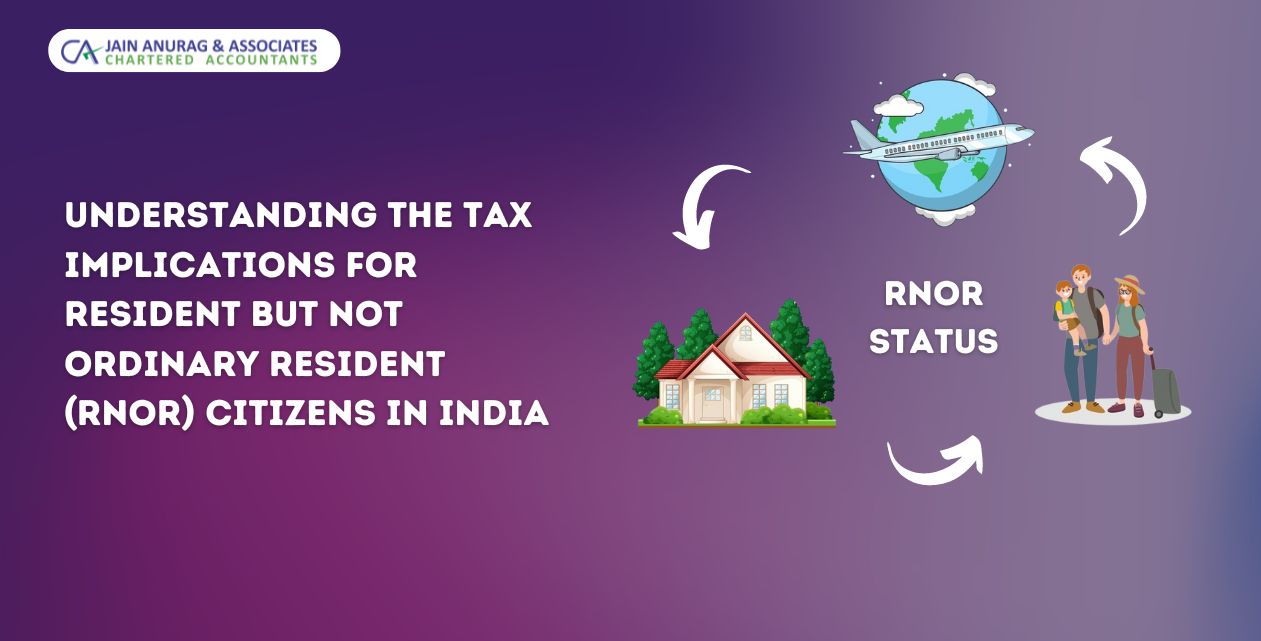May 22, 2024, Posted by Admin
TAX IMPLICATIONS FOR RESIDENT BUT NOT ORDINARY RESIDENT (RNOR) CITIZENS

Resident but Not Ordinarily Resident (RNOR) status is a unique tax classification in India that applies to individuals who meet certain criteria regarding their residency status. This classification has significant implications for the taxation of income earned by such individuals. Let's delve into the taxability of income for RNOR citizens in India.
What is RNOR Status?
RNOR status is determined based on the residency criteria outlined in the Indian Income Tax Act. An individual can be classified as RNOR if they meet one of the following conditions:
- They have been a non-resident in India for 9 (Nine) out of the 10 (ten) previous years preceding the relevant financial year. or
- They have been in India for a period of 729 days or less in the 7 (seven) previous years preceding the relevant financial year.
Example : Mr. Shah, an Indian citizen, moved abroad for employment in the financial year 2015-16. He returned to India temporarily for a brief period during FY 2020-21. Now, he wants to determine his residency status for FY 2021-22.
Calculation for RNOR Status:
- Check Previous Years' Residency:
- Determine Mr. Shah residency status for the past ten years preceding FY 2021-22 (i.e., FY 2011-12 to FY 2020-21).
- Let's assume Mr. Shah was a non-resident for nine out of these ten years, as he was working abroad.
- Calculate Stay in India for the Seven Previous Years:
- Determine the number of days Mr. Shah spent in India during the seven previous years (FY 2014-15 to FY 2020-21).
- Suppose Mr. Shah visited India for a total of 600 days during this period.
- Determine RNOR Status for FY 2021-22:
Since Mr. Shah has been a non-resident for nine out of the ten previous years and his total stay in India during the seven previous years is less than 729 days.
He has to qualify any of the one condition to become RNOR however he qualifies both the condition so his status is RNOR for FY 2021-22.
Taxability of Income for RNOR Citizens:
- Income Earned in India:
- RNOR citizens are taxed on income earned or received in India. This includes salary, rental income, capital gains from the sale of assets situated in India, interest income from Indian sources, etc.
- Income Earned Abroad:
- Income earned by RNOR citizens from sources outside India is generally not taxable in India. This includes salary earned abroad, income from foreign investments, and capital gains from the sale of foreign assets.
- Taxation of Foreign Assets:
- RNOR citizens are not required to pay tax on income earned from foreign assets, such as bank accounts, properties, or investments held outside India.
- Tax Deductions and Exemptions:
- RNOR citizens are entitled to claim tax deductions and exemptions available under the Indian Income Tax Act, subject to certain conditions. This includes deductions for investments made in specified instruments like Provident Fund, Equity Linked Savings Schemes (ELSS), etc.
- Taxation of Retirement Benefits:
- Retirement benefits such as pension received by RNOR citizens from their previous employment abroad are generally not taxable in India. However, any income earned from such benefits if invested in India may be subject to tax.
Planning for RNOR Status:
- Investment Planning:
- RNOR citizens should carefully plan their investments to optimize tax benefits. They can consider investing in tax-efficient instruments both in India and abroad.
- Residency Planning:
- To maintain RNOR status, individuals should monitor their stay in India and ensure compliance with residency criteria outlined in the Income Tax Act.
- Consultation with Tax Experts:
- Given the complexity of tax laws, RNOR citizens should seek guidance from tax experts to ensure proper tax planning and compliance.
Conclusion:
Understanding the tax implications for RNOR citizens is essential for effective tax planning and compliance. By leveraging the benefits of RNOR status and planning their finances accordingly, individuals can minimize their tax liabilities and maximize their savings.
In the case of Resident But Not Ordinarily Resident (RNOR) individuals who have recently returned to India, one can maintain their RNOR status for up to 3 financial years after their return.
It's crucial for RNOR citizens to stay updated on any changes to tax laws and seek professional advice when needed to navigate the intricacies of tax planning and compliance effectively.
We, at Jain Anurag & Associates, Chartered Accountants, are a leading firm specializing in providing comprehensive services tailored for NRI clients. From income tax to FEMA compliance, our solutions cover every aspect of tax requirements, ensuring full regulatory adherence and financial optimization for our clients